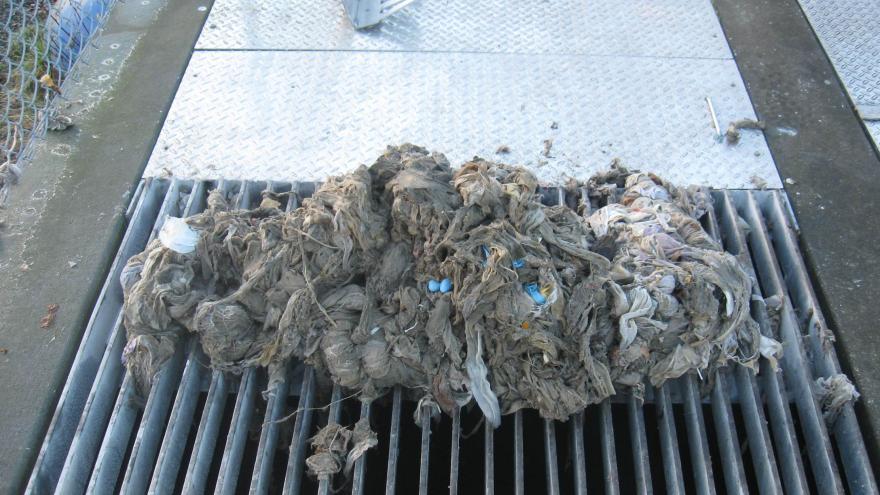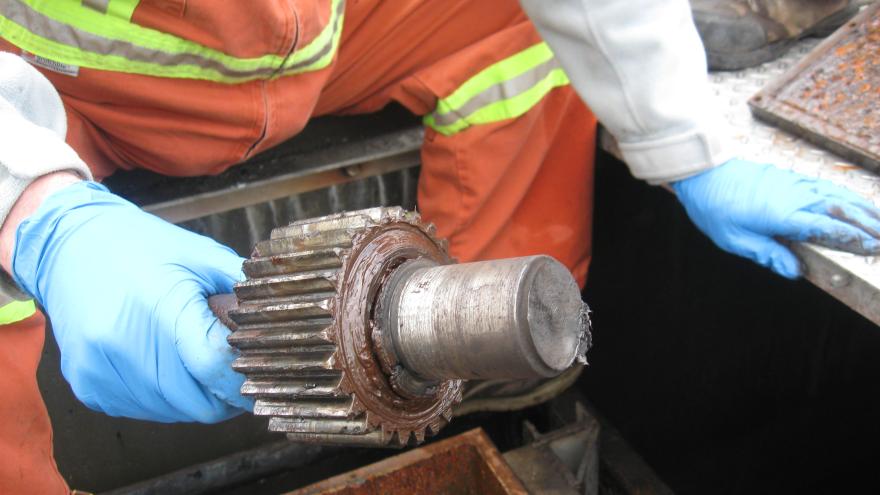Help! Stop clogging pipes, don't flush wipes!
The label might say "flushable" but disposable wipes are clogging our sewer lines and damaging pumps and other equipment. Not only are these problems expensive to fix but they can also cause raw sewage overflows into homes, businesses and local waterways.
Don't flush trouble: These items should not go down the drain!
Wipes, even those that are labeled “flushable or disposable”
- This includes nursing and diaper pads, baby, personal, cleaning and facial wipes and paper towel.
- These items, despite their claims, do not disintegrate quickly enough in sewer systems causing clogs in sewer pipes and treatment plant machinery and cost taxpayers thousands of dollars in repairs and maintenance.
Medication
- Some medication can be broken down during the water treatment process, yet many drugs are able to pass unchanged through the process, directly entering the receiving environment.
Fats, oils, grease and leftover food
- Grease sticks to household and sanitary sewer pipes. Over time, grease build-up will block the entire pipe and result in raw sewage backing up into your home or overflowing into the street or waterway.
- Avoid use of garburators as they can cause an overload of solids, requiring more chemical use for treatment and could contaminate the receiving environment.
Other items
- Band-aids and bandage wrappers
- Condoms
- Cotton balls, swabs and pads
- Dental floss and teeth whitening strips
- Hair
- Kitty litter
- Mini and maxi pads
- Tampons and applicators
- Paint and other chemicals
Flushing the wrong things down the toilet damages your household plumbing, your environment and the wastewater treatment system. If it isn't sewage or toilet paper, put it in the trash instead of the toilet.
Where should these items go?
Medications
Medications can be returned to pharmacies that participate in the medication return program which includes: London Drugs, Thrifty Foods, Festubert Pharmacy, Ingram Pharmacy, Kenneth Street Pharmacy, Pharmasaves, Rexall Drugstores and Shoppers Drug Marts
Wipes
Unfortunately, all wipes belong in the trash. Consider switching to environmentally friendly alternatives such as re-usable towels, mops and cloth diapers (which also do not get flushed).
Fats, oils and grease (FOG)
After cooking, small amounts of FOG can be wiped off with a paper towel and placed in the compost before washing in the sink or dishwasher; larger amounts of FOG should be poured into a plastic container and brought to Bings Creek Recycling Centre to be recycled.
You can use baskets or strainers in sink drains to catch food scraps and other solids, they can then be put in the compost. Remember to never put produce stickers down the drain.
Other items
Most other items like band-aids, dental floss, condoms and feminine hygiene products should only be put in the trash. However, paint, pesticides and motor oil can be recycled at Bings Creek Solid Waste Management Complex and Peerless Road Recycling Centre free of charge.
Read the Cowichan Recyclopedia
For more information, including how to get rid of things you no longer want or need, please contact the Engineering department.


